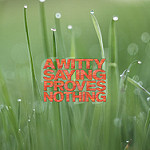By Kristin Nelson & Angie Hodapp
For Part 1 and the genesis of this series, click here.
For Part 2, click here.
For Part 3, click here.
For Part 4, click here.
For Part 5, click here.
For Part 6, click here.
For Part 7, click here.
For Part 8, click here.
I bet you thought this day would never come. At long last, we are tackling the 9th opening to avoid.
And I have to admit that in the months since we started this article series, we’ve probably come up with another 9 openings that could spell trouble—so alas, perhaps this installment is not the finale. Regardless, thank you so much for reading each article, leaving comments on Pub Rants, and taking this journey with us. We’ve been delighted and humbled by the amount of love this article series has garnered on Twitter, Facebook, et al.
Your opening pages might be in trouble if…
#9) Your novel opens with pithy wit or wisdom that will become the story’s theme.
As we’ve been saying all along, it’s not that you can never use this type of opening. We’re especially delighted when writers leave examples of successful novels that open with something we’re suggesting that you avoid—of course something must be done before it can be overdone. So our intent has always been to highlight for you what’s become overdone, to point out that we see a ton of openings that rely too heavily on this construct. Any overdone opening can prevent your original work from standing out. When we are looking at thousands of submissions a year, it’s easy for this opening to get dismissed. Simply proceed with caution.
Examples of first lines that employ pithy wit or wisdom that will become the story’s theme:
- “Two wrongs don’t make a right. That’s what I learned the summer I turned sixteen.”
- “My grandmother always told me ‘be careful what you wish for.’ Boy, was she right.”
- “If only I knew then what I know now.”
- “My father’s favorite saying was ‘the key to failure is trying to please everybody.'”
- “Life is like playing the violin in public and learning the instrument as one goes on.”
There are a couple cautions with these types of openings. First, look at the first three bullet points above. With these, you risk zapping tension for your reader. How? Well, as James Scott Bell says, readers read to worry. We read because we want to (a) watch your character achieve or fail at a particular goal in the face of seemingly insurmountable obstacles, and (b) find out if your character will learn/grow/change as a result of the struggle. So when you open with your protagonist basically proclaiming, “Hey, here I am on the other side of the struggle, and I’m OK or I wouldn’t be here to tell you the story, and by the way, here’s the lesson I’m going to learn by the end,” then readers already know too much and we have an excuse not to be that super worried about him. Tension zapped.
Second, look at the fourth and fifth bullet points above. These types of “proverby” openings tend to lack context. They’re “narrative camera pulled way far out” openings; you haven’t introduced me to your character yet, and I don’t know what conflict she’s facing, so I feel plopped down in the middle of some stranger’s life philosophy. That means my eyes are going to skim right over this kind of thing to search for where your story actually starts.
In sum, to truly judge how well an author executes a “pithy wit or wisdom” opening (something employed more often in literary works than in genre fiction), we’d have to look at what comes next. We’d have to see how it frames whatever scene or narrative follows. But again, if your goal is to stand out in the slush pile, then avoid opening with writing that a slush reader might consider skim-or-skip material.
And as a fun counterpoint to this series (and because we do have a sense of humor), why not check out Max Winters (Exes) 10 Writing Rules You Can (And Should) Break.
Creative Commons Photo Credit: Brett Jordan


The 9 Story Openings to Avoid is an excellent series. Thank you, both for views into “what not to do” and insight from those who have spent hours in the slush pile. I especially enjoy your ability to deliver “bad news” with humor and amusement. Well done.
Best Wishes,
George